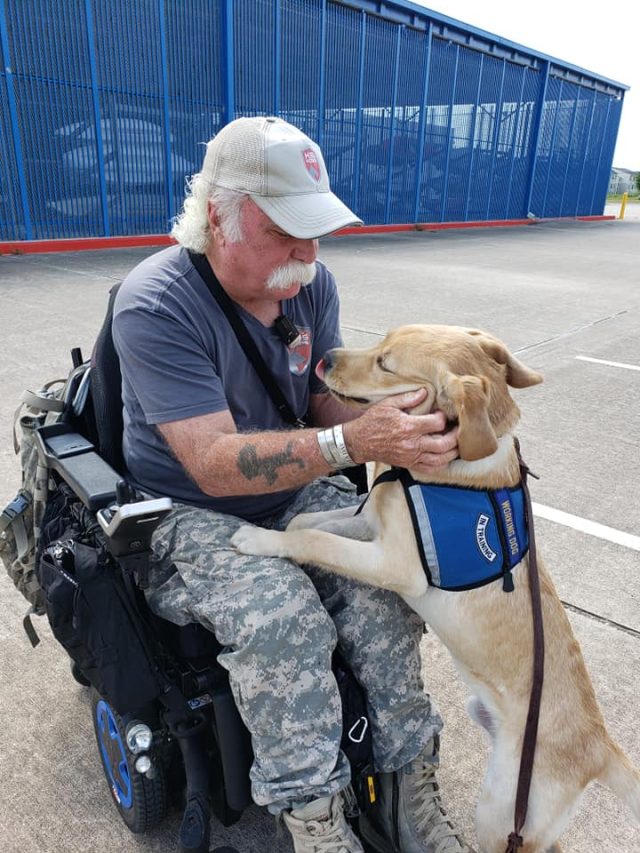Service Dogs in Public Spaces
September is National Service Dog Month. Check out ESGH’s Veterans Service Dog Program.
Thirty-five years ago, the Americans with Disabilities Act (ADA) classified “service animals” with other reasonable accommodations. Today, service dogs are an everyday sight in stores, airports, and other public places – and most people take their presence for granted.
Still, there are occasional problems. As one ESGH client reported: “I’ve had METROLift drivers say there was nothing about a dog on their sheet: they don’t know that the ‘SA’ abbreviation under my name stands for ‘service animal.’ Some have actually lied to get out of driving us: one driver first tried to say she wasn’t there to pick me up (the website clearly showed she was), and then told her dispatcher that my trained service dog growled and lunged at her. I sent a report in, but METRO never called back and asked for my side of the story.”
Service Dogs in Small Spaces
Many people who accept service dogs in open areas do feel differently about sharing space in vans, rideshare cars, elevators, and other tight spots. Sometimes it’s a case of one person’s disabilities clashing with another’s: there are people who risk anaphylactic shock by getting too close to where a dog has recently been. Nonetheless, most transit/rideshare policies (as with both Uber and Lyft) specify that allergy is no excuse for refusing to take a service dog.
There are, however, some exceptions to the “service dogs can go anywhere” rule.
- For health reasons, service dogs are not permitted in surgery rooms or other heavily sanitized environments. They are allowed in most other places where their handlers receive medical care, including ambulances.
- Health laws also ban any dog from swimming in public pools. A service dog may enter the rest of the pool area.
- Under separation-of-church-and-state laws, “places of worship” are not required to admit service dogs (though most will anyway).
- When someone has multiple service dogs (see next section), a public venue may ask that just one dog come in if space is limited; e.g., if a restaurant is crowded and only one dog can squeeze in by the handler’s barstool.
Other Lesser-Known Facts
- It’s legal to have more than one service dog, provided each is trained for different duties. For example, a handler may bring one dog for hearing assistance and a second dog for seizure alert.
- Service dogs are legally required to be trained for specific tasks; to avoid disruptive behavior; and to follow the same leash, vaccination, and licensing rules as other dogs. Service dogs are not legally required to be registered as “service animals” with their home cities; to wear vests/accessories identifying them as service dogs; or to be trained by certified professionals if their future handlers can train them.
- Ear protection designed for dogs is available if a service animal accompanies its handler to concerts or other noisy venues.
- Some locations allow “service dogs in training” where they wouldn’t allow other dogs; so minor distractibility or restlessness doesn’t necessarily indicate service dog fraud. However, it’s time to inform the authorities if a dog in a “service” vest shows signs of aggression, barks constantly, or “marks” inappropriate places.
Good Manners
If you’re out in public and meet someone with a service dog:
- Rule #1: Don’t touch, feed, crowd, or talk to a dog that’s on duty. (In fact, it’s both polite and prudent to avoid touching any dog without asking its human companion first.) And don’t assume that a dog is off duty just because it’s lying down or seems relaxed.
- If you’re with a (non-service) dog yourself, keep it from trying to play with the service dog.
- Some handlers are eager to share about their dogs and/or disabilities; other people prefer their privacy. Feel free to begin a conversation, but never try to force one.
- Show respect at all times.
For more on specific laws and rules regarding service dogs, see “Frequently Asked Questions about Service Animals and the ADA,” from ADA.gov.
- Katherine Swarts, BridgingApps, Digital Content Writer, Easter Seals Greater Houston
